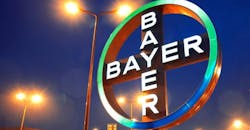Elanco Animal Health Inc. clinched the purchase of Bayer AG’s animal-health unit in a deal valued at $7.6 billion, creating one of the biggest stand-alone veterinary-medicine companies in the world.
Elanco, which was spun out from drugmaker Eli Lilly & Co. last year, will finance the acquisition with a mix of cash and stock. German drug giant Bayer AG will receive $5.32 billion in cash and $2.3 billion in Elanco Animal Health common shares. The transaction is expected to close in mid-2020.
“This will create the No. 2 animal-health company,” Elanco Chief Executive Officer Jeffrey Simmons said in an interview. “We see this as a nice complement. The pet owner, the veterinarian and the farmer win in this transaction.”
Shares of Elanco have been under pressure since news of the potential transaction first surfaced earlier this summer. Bloomberg reported that the companies were close to a deal on Aug. 7.
Elanco declined as much as 6.3% in New York trading on Tuesday. Bayer shares traded in Germany were down less than 0.1%.
Elanco, based in Greenfield, Indiana, expects the deal to add to its adjusted earnings per share in the first full year after it closes. Buying the Bayer division will significantly bulk up its pet business at a time when the agricultural sector has turned more volatile. Last week, Elanco narrowed its sales guidance as a result of the outbreak of a deadly swine flu in Asia, which caused a decline in its farm unit.
“With a larger, more diverse animal-health company, the percentage of the vulnerability will be less,” Simmons said, adding that he expects the current swine flu outbreak will eventually pass.
Pfizer Inc.’s decision to spin out its animal-health business, Zoetis Inc., in 2013 has prodded other drugmakers to shed their veterinary units. The businesses are often stable, profitable operations whose fortunes are more tied to macroeconomic trends like rising global wealth and protein consumption, instead of risky bets on drug research.
For Bayer, the sale adds to the resources it could draw from to pay potential costs for thousands of claims that Roundup, the weedkiller it gained in last year’s Monsanto acquisition, causes cancer. Bayer is in discussions on a possible settlement, but reaching a resolution could take months, people familiar with the matter have said.
Simmons said Elanco won’t face any exposure to the Roundup suits.
Bullish Sector
Zoetis, the former Pfizer unit, has seen its stock almost triple since it became an independent company. Elanco finished trading on Monday up 24% since its 2018 stock-market debut. Merck & Co. remains the only major pharmaceutical company that has held onto its animal-health unit, which generates about a 10th of its revenue.
The deal would make Elanco the second-largest global animal-health business after Zoetis in terms of revenue, increasing its reach among farmers and pet owners. While it would be the new company’s biggest deal as an independent business, parent Eli Lilly bought Novartis AG’s animal-health unit in 2015 for $5.4 billion and combined the two firms’ assets.
“Our top focus is now delivering our pipeline, bolt-ons, and other M&A is not needed,” Simmons said.
Wall Street analysts have expressed reservations about the potential deal, saying that the Bayer business is unlikely to deliver a significant boost to Elanco’s growth.
“Elanco is buying what I view as a flat-to-declining business that doesn’t innovate and has a high concentration risk,” Kevin Ellich, an analyst at Craig-Hallum Capital Group, said in an interview before the deal was announced. “The deal is dilutive to shareholders. At the end of the day, it’s just not that attractive. I don’t see how the stock goes up.”
Simmons said he’s looking forward to setting the record straight with investors. “Now we’re able to respond to the marketplace: There’s been no change in our strategy, this is about growth and innovation,” he said.
Elanco intends to work with regulators on potential antitrust issues, but sees the two portfolios as complementary.
Goldman Sachs served as financial adviser to Elanco, while Paul, Weiss, Rifkind, Wharton & Garrison LLP and Hengeler Mueller were its legal counsel. Elanco’s board of directors was provided a fairness opinion by Duff & Phelps. Bank of America Merrill Lynch and Credit Suisse acted as financial advisers to Bayer, while Sullivan & Cromwell, PwC Legal and Linklaters served as its legal advisers.
By Riley Griffin
About the Author
Bloomberg
Licensed content from Bloomberg, copyright 2016.
